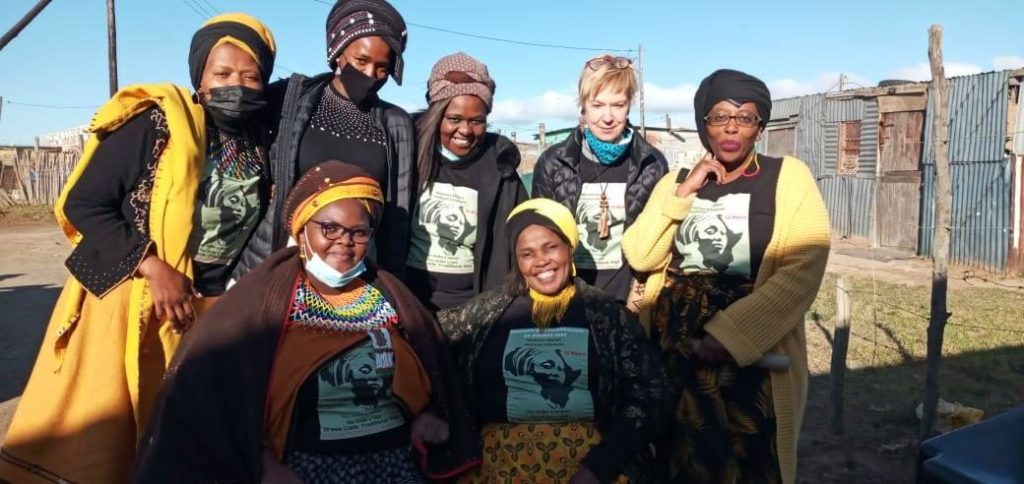By POELO IRENE KETA
They sang “Wathintabafazi wathintimbokotho” (“You strike a woman, you strike a rock”). They proudly commemorated the heroics of the 1956 Women’s March on the Union Buildings against apartheid laws. They donned beautiful traditional clothing and activist T-shirts. They celebrated womanhood.
But, the women of eThembeni mostly honoured National Women’s Day on Monday by tackling, head-on, the myriad challenges confronting South African women in 2021.
Limise Gagayi, who planned the event (with the help of her husband!), is a dynamo in this community. In the wake of the Covid-19 lockdown in April 2020, she started a soup kitchen, cooking two days a week and donating clothing. “We depend entirely on donations that we get from Makhanda residents,” she says.
Her group of volunteers also focus on celebrating special events, such as Mother’s Day, Father’s Day, June 16th, and Women’s Day.

This year, the group invited women from all over Makhanda to talk on various topics, from unplanned pregnancy, abuse, marriage laws, and criticism in the workplace.
Lungelwa Bhuwa spoke about unplanned teenage pregnancies: “Poverty is the main contributing factor for unplanned pregnancies. Because of the difficult circumstances at home, girls get drawn to sugar daddies and the life they promise them, and then we end up with girls getting pregnant while there’s no food at home.”
Bhuwa said the problem of absent fathers also contributes to girls falling for older men because they seek affection from these men to fill the void left behind by their fathers. She encouraged mothers to show their daughters love and affection, so they are not led astray from a young age.

Milanda Coetzer spoke about the different kinds of abuse and identifying them, drawing on her distinguished 30-year career in the Makhanda SAPS. Several audience members were left shocked at the realisation that they had experienced abuse in one form or another at some point in their life.
Coetzer explained that many women often do not report abuse because they are unaware that what happens to them constitutes abuse, such as married women raped by their husbands or people who only share one night with their perpetrators. “Even if you spend only one night with someone, you are covered by the Domestic Violence Act, so do not be afraid to speak out,” she said.

She urged women to look out for signs of abuse. “The most common sign of emotional or psychological abuse is tiredness. If a person goes from being energetic to suddenly being tired all the time, that could be a sign of abuse.”
Many children get abused for years without it being detected. “It’s important for whoever is responsible for bathing children to look out for signs of physical abuse on children.
“Children will act differently when you bathe them if they’ve been physically abused – they will prevent you from touching their private areas, they’ll even prevent you from bathing them. Some of them become bedwetters again because they’ve been abused, and they’re afraid to use the bathroom; that’s a very physical attribute to look out for.”
Gagayi looks forward to having more events in the future, but this one has been significant to her: “I hope people have gained a lot of knowledge and skill from this event. We have learned many things today that we didn’t know about, especially in terms of abuse.
“Women’s month means a lot to me because there are many challenges facing women, whether you’re single or married, so we need to be educated about looking after our houses, raising our children, and running a business. We need to have more events like this to learn about these things,” she explained.
Catherine Deiner, who spoke about dealing with rejection in marriage or relationships, informed the women that the Rhodes University Psychology Clinic offers free counselling to community members.

To apply to access any of the services that the Rhodes University Psychology clinic offers, phone 046 603 8502 or download, complete and return the form below to psychologyclinic@ru.ac.za
- Application for Services 2021 and covering letter English
- Application for Services 2021 and covering letter isiXhosa
As the event came to an end, the Chair of the Makana Residents’ Association, Sally Price-Smith, reminded women of their hard-fought right to vote and how powerful their vote is.
“I implore you to really consider, with the upcoming election, to make sure you are registered to vote. Get your youngsters to register to vote, exercise your right to vote; that’s your power. In the last election, only 25 000 people in Makhanda voted; there are 80 000 people here, so if more people voted, that’s a bigger voice, a bigger mandate to those people that we send to council in the next election.”



